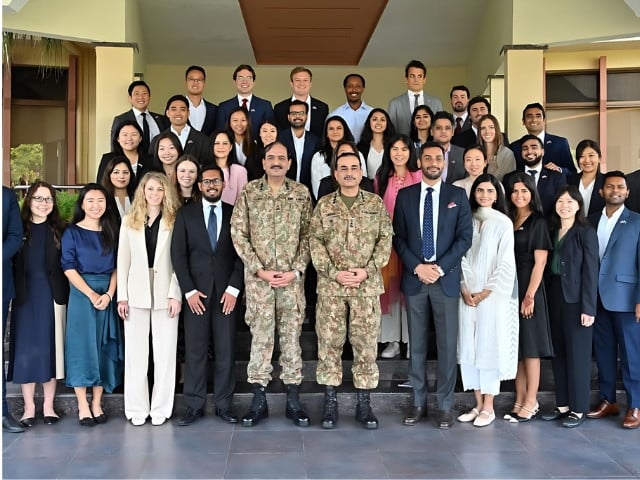———– Meets Harvard students delegation at GHQ, Rawalpindi
———– Highlights Pakistan’s vast potential to delegation
———– Harvard students thank Army Chief for enlightening interaction
RAWALPINDI: Chief of Army Staff (COAS) General Syed Asim Munir underscored the importance of education, critical thinking, and innovation in addressing modern security challenges during a meeting with a delegation of 44 Harvard Business School students at the General Headquarters on Thursday.
The delegation, representing nine countries, engaged in an interactive session that highlighted Pakistan’s crucial role in promoting regional peace, combating terrorism, and upholding democratic values, according to an Inter-Services Public Relations (ISPR) statement.General Munir encouraged the students to form their own opinions based on personal experiences while cautioning them about the dangers of misinformation and fake news in the digital era.
The Harvard students expressed their gratitude for the opportunity to engage in a meaningful dialogue with the army chief.
This session follows the COAS’s previous interaction with university students on August 30, reflecting his ongoing commitment to inspiring Pakistan’s youth.
Meanwhile, A delegation of 10 Pakistani students enrolled in the MBA program at Harvard University met with Minister for Planning, Development and Special Initiatives, Professor Ahsan Iqbal on Thursday.
The students, who have experience working with top companies in Pakistan and abroad, were briefed on the ministry’s affairs by Member Social Sector Rafiullah Kakar. He informed the students that the ministry was a key center for all development-related planning and initiatives in the country.
The minister asked the students that they were the future stars of Pakistan, and universities like Harvard were always on the lookout for future leaders. He said that the doors of the public sector in Pakistan were always open to young people like them.
Ahsan Iqbal shared his own political journey, from his time at the University of Pennsylvania’s Business School in 1983 to his election as a member of the National Assembly in 1993.
He highlighted key policies he had been involved in, including the first IT policy in 1998, the Overseas Scholarship Scheme, and the launch of the China Pakistan Economic Corridor (CPEC) project in 2013.
The minister stressed that stability and continuity in policies are crucial for the country’s development, citing the need for a five-year development plan under the 5Es framework.
–Agencies






